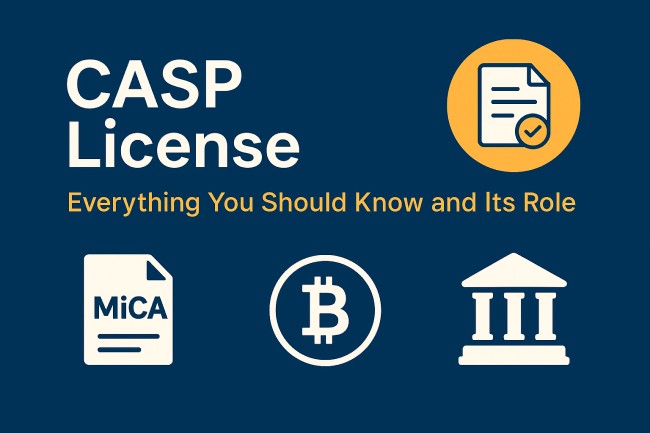CASP License: Everything You Should Know and Its Role

The digital financial landscape in Europe is undergoing significant changes with the introduction of the MiCA regulations, which aim to create a cohesive legal framework for crypto assets and services. These regulations, designed to bring transparency and security to the digital finance sector, have led to the establishment of a key player in the industry: the Crypto Asset Service Provider (CASP) license. If you’re looking to operate a crypto business within the European Union (EU), understanding the CASP license is essential for compliance and future growth. This article will break down everything you need to know about this license and its role in the evolving regulatory landscape.
What is the CASP License?
The CASP license is a regulatory requirement for businesses offering crypto-related services within the EU under the MiCA regulations. Crypto Asset Service Providers, or CASPs, are businesses that manage, trade, or advise on crypto assets, including cryptocurrencies and other types of digital tokens.
In simple terms, the CASP license serves as a form of official recognition for companies in the crypto industry, confirming that they meet the necessary legal standards to operate within the EU. This licensing regime is a crucial step for businesses that want to ensure their operations align with MiCA regulations and foster trust with their clients.
Why is the CASP License Important?
Obtaining a CASP license is not just about legal compliance – it is also an essential tool for establishing credibility and attracting investors. In today’s world, where financial security is a top concern, businesses that carry a legitimate license are often more appealing to potential clients and partners.
Here’s why having a CASP license matters:
- Legal Recognition: It proves that your business complies with EU regulations, which is vital for attracting clients in the regulated European market.
- Operational Integrity: The process of acquiring a CASP license requires stringent checks, ensuring that licensed businesses adhere to high standards of business practice.
- Market Access: A CASP license is a necessary step for expanding your operations within the EU, allowing you to offer a wide range of crypto services, including custody and trading.
MiCA Regulations: A Crucial Component for Crypto Businesses
The MiCA (Markets in Crypto Assets) regulations are a comprehensive set of rules designed to regulate the crypto market in the European Union. These regulations cover everything from stablecoins to token offerings, providing clarity and transparency for crypto businesses.
The MiCA regulations have several key objectives:
- Consumer Protection: Ensuring that investors in crypto assets are protected from fraud and market manipulation.
- Financial Stability: Addressing systemic risks that may arise from the growing crypto market, ensuring it doesn’t destabilize the traditional financial system.
- Innovation: Fostering a competitive and innovative environment for crypto businesses in the EU.
In short, MiCA is designed to create a robust and secure environment for crypto businesses while making sure that these businesses align with EU financial regulations.
The Role of the CASP License in MiCA Compliance
The CASP license directly ties into the MiCA regulations by ensuring that crypto businesses meet the legal requirements outlined in the framework. It functions as a regulatory checkpoint, confirming that the business follows anti-money laundering (AML) practices, customer protection policies, and data security standards.
To operate under MiCA regulations, crypto businesses must:
- Register as a CASP: A CASP license is a necessity for crypto businesses operating within the EU.
- Adhere to AML/CFT Protocols: Crypto businesses must implement measures to prevent money laundering and terrorist financing.
- Offer Transparency: Businesses must disclose important information to users and regulators about the risks of their products and services.
By acquiring a CASP license, companies demonstrate their commitment to adhering to MiCA regulations, making them more attractive to both regulators and clients.
Steps to Obtain a CASP License
Obtaining the CASP license can be a detailed process. Here are the key steps involved:
- Preparation: Gather all the necessary legal and financial documents. You’ll need to show that your business can meet the financial and operational requirements of the MiCA regulations.
- Application: Submit an application to the relevant EU regulatory authority. This will require a detailed outline of your business operations, policies, and security practices.
- Compliance Assessment: The regulatory authority will review your business and assess its compliance with the MiCA regulations. This includes a thorough check of your business’s internal controls and AML practices.
- Granting the License: If your business meets all the regulatory requirements, the license will be granted, and you will be officially recognized as a CASP within the EU.
It’s worth noting that the process can take several months, depending on the complexity of your business. However, the benefits of having a CASP license – such as access to a regulated market and increased trust with clients – far outweigh the challenges.
Key Benefits of the CASP License
The CASP license comes with a host of advantages for businesses operating in the crypto space:
- Enhanced Credibility: A CASP license shows clients and investors that your business is serious and adheres to high regulatory standards.
- Market Expansion: With a CASP license, your business can legally offer crypto services within the EU, opening doors to new markets.
- Security and Trust: Regulatory oversight ensures that your business operates securely, giving clients peace of mind when using your services.
Challenges and Considerations
While the benefits of having a CASP license are clear, it’s important to note that obtaining the license can be a time-consuming and resource-intensive process. Businesses must invest in legal compliance, operational changes, and security upgrades to meet the stringent requirements.
Furthermore, businesses need to stay updated with any changes in the MiCA regulations to maintain compliance over time. The crypto market is still evolving, and regulations will likely continue to adapt as the industry grows.
Conclusion
In conclusion, the CASP license plays a vital role in the EU’s crypto ecosystem, helping businesses meet MiCA compliance and providing them with the necessary legal framework to operate in the regulated market. It ensures that crypto businesses can offer secure and transparent services to clients, boosting trust and confidence in the sector. If you’re considering registering your crypto business under MiCA compliance, obtaining a CASP license should be at the forefront of your plans.
For more information on how to navigate the process of obtaining a CASP license, feel free to consult with experts like Fintech Harbor Consulting LTD, who can guide you through the regulatory requirements.



